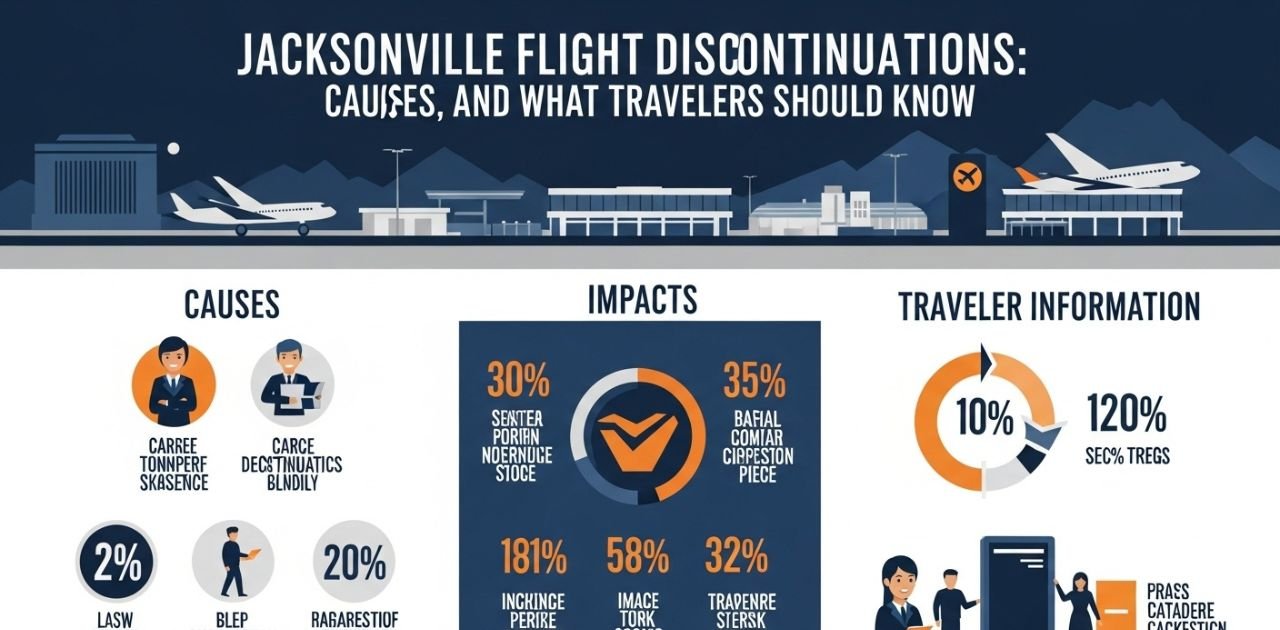Air travel is constantly evolving, and one trend that has caught attention in recent years is the rise of Jacksonville flight discontinuations. For travelers relying on Jacksonville International Airport (JAX), these changes can mean sudden shifts in travel plans, higher costs, or fewer options. But why are flights being discontinued, and what does it mean for passengers and the local economy? Let’s break it down.
What Are Flight Discontinuations?
A flight discontinuation happens when an airline decides to stop operating a particular route. This can be temporary—such as pausing during off-season travel—or permanent, if the route is no longer considered profitable.
In the case of Jacksonville, flight discontinuations have affected both domestic and international routes, leaving many travelers asking what’s behind these changes.
Why Airlines Discontinue Flights in Jacksonville
Several factors play into airlines’ decisions to cut or suspend service to and from Jacksonville:
1. Low Passenger Demand
Routes with fewer passengers are often the first to go. Airlines operate on thin margins, and if flights are not filled consistently, they become unsustainable.
2. Rising Operational Costs
Fuel prices, staffing shortages, and maintenance costs all impact profitability. Smaller markets like Jacksonville sometimes face cuts when airlines need to optimize resources.
3. Seasonal Travel Patterns
Airlines may discontinue certain flights in slower months when fewer travelers are flying. These seasonal cuts can return during peak demand periods.
4. Competition from Nearby Hubs
Major airports in Orlando, Atlanta, and Miami offer more frequent routes and cheaper fares. Travelers often prefer these hubs, reducing demand in Jacksonville.
5. Strategic Airline Shifts
Carriers constantly review their route networks. When new opportunities arise in high-growth markets, aircraft and crews may be reassigned away from Jacksonville.
Temporary vs. Permanent Discontinuations
It’s important to note that not all Jacksonville flight discontinuations are permanent.
- Temporary suspensions happen when airlines pause service due to low seasonal demand, planning to restart later.
- Permanent discontinuations mean the route is removed entirely with no plans to resume, often because of long-term profitability issues.
Travelers should always check whether a route is permanently canceled or just suspended before making future plans.
Impact on Travelers
Flight cuts can have a direct effect on passengers, especially frequent flyers and business travelers. Some of the most common impacts include:
- Fewer direct options – Travelers may need to rely more on connecting flights.
- Longer travel times – With fewer non-stop routes, total travel time increases.
- Higher ticket prices – Reduced competition often drives fares upward.
- Uncertainty in planning – Travelers may hesitate to book far in advance if routes are unstable.
Impact on Jacksonville’s Economy
Beyond passengers, Jacksonville flight discontinuations have broader consequences:
- Tourism decline – Fewer flights make it harder for visitors to reach Jacksonville directly.
- Business challenges – Companies that rely on fast connections may face difficulties.
- Airport revenue loss – Fewer travelers mean lower income from parking, concessions, and services.
- Reduced visibility – With fewer international links, Jacksonville risks losing ground as a competitive destination.
How Travelers Can Adapt
If you frequently fly in or out of Jacksonville, here are some strategies to minimize disruptions:
- Book early – Secure seats before airlines adjust schedules further.
- Stay flexible – Consider nearby airports as alternatives.
- Use flight alerts – Sign up for notifications to track route changes.
- Explore connections – Sometimes a short stopover can open up more affordable options.
The Future of Jacksonville Flights
While flight discontinuations may feel like a setback, they’re also part of a normal airline cycle. As demand shifts and economic conditions improve, airlines often reintroduce routes or expand into new destinations. Jacksonville’s growing population and strong tourism market suggest that the airport will continue to attract new routes over time, even if some flights disappear for now.
Final Thoughts
Jacksonville flight discontinuations highlight the dynamic nature of the aviation industry. For travelers, the key is staying informed, adapting to changes, and exploring alternatives when necessary. For the city, the challenge lies in balancing economic growth with the need to remain connected globally.
While flights may come and go, Jacksonville remains an important hub for both leisure and business travelers, and its role in regional air travel is far from over.
